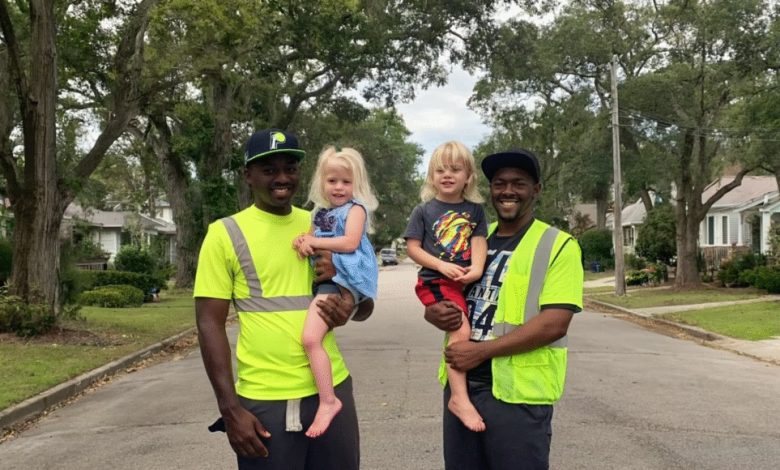Every Monday, They Waited for the Garbage Truck—Until Everything Changed

Every Monday, Like Clockwork
Every Monday, like clockwork, Jesse and Lila pressed their little faces against the front window, waiting—not for cartoons or snacks, but for the garbage truck.
They didn’t care what was inside the bins. For them, it was about the noise, the rhythm, the show of it all.
But most of all, it was about two men they adored: Theo and Rashad.
Theo was quiet and kind, always giving a single honk just for them. Rashad was full of energy, waving like he hadn’t seen them in years.
To the twins, they weren’t just sanitation workers. They were weekly heroes in orange vests—reliable, warm, and full of magic.
The waves turned into high-fives. The high-fives turned into chats. Then came small gifts.
One Monday, Rashad brought each of them a toy garbage truck. Jesse treated his like treasure. Lila made a little shoebox bed for hers beside her pillow.
And then, one Monday, everything changed.
I collapsed at home—sick, exhausted, barely conscious. I managed to dial for help, but everything blurred before I could say much.
When I woke up in the hospital, terrified and disoriented, a nurse leaned in and whispered:
“Your babies are safe. The two men who saved your life are right outside, waiting to say hello.”
It was Theo and Rashad.
They’d noticed something off—no kids at the window, no wave, no honk. Just silence.
When no one answered the door, they heard crying inside. They looked through the window and didn’t hesitate—they called for help, stayed with Jesse and Lila until paramedics arrived, and made sure my children were safe.
They didn’t just do their job that day.
They saved my family.
When I was finally discharged, I made sure to be on the porch that next Monday. Jesse and Lila ran to greet them like nothing had changed. But for me, everything had.
I choked out a thank-you, overwhelmed.
Rashad just hugged me and said, “We look out for our people.”
From then on, Mondays became sacred.
We started leaving out coffee and muffins. The kids drew pictures for the truck and stuck them on with magnets. Theo kept one in his locker. Rashad brought stickers each week.
It wasn’t just a routine anymore. It was friendship.
One morning, Theo asked me, “Have you ever thought of telling your story?”
I laughed. “Who would care about a garbage truck and two preschoolers?”
“You’d be surprised,” he said. “People need reminders that good still exists.”
So I shared it—a short post about the twins, the truck, and the men who noticed something was wrong and stepped in.
It went viral.
Thousands shared it. Local news picked it up. A citywide fundraiser launched to support sanitation workers. The mayor gave Rashad and Theo an award. Jesse and Lila got tiny hard hats and honorary badges.
But none of that is what stuck with me most.
Months later, Jesse had a meltdown. Lila had pulled the bin lever twice, and he didn’t get a turn. It was a chaotic morning—spilled cereal, smeared toothpaste, me barely hanging on.
I was ready to haul them inside when Theo crouched beside Jesse.
“Hey buddy,” he said gently, “sometimes your sister gets two turns. But guess what? You get shotgun today.”
Jesse sniffled. “Really?”
“Really. Safety vest and all.”
And his whole face lit up.
That’s when I understood: it was never just about the garbage truck.
It was about what Theo and Rashad represented—kindness, consistency, quiet heroism.
The kind of people who show up when it matters.
The kind who carry your world when you can’t.
These days, life is steadier. My husband’s home again. I’m back at work part-time. Jesse and Lila are in kindergarten now.
But Mondays?
They’re still sacred.
The twins wait on the porch in sneakers instead of bare feet—but with the same spark in their eyes.
And I sit on the steps, coffee in hand, grateful—not just for Theo and Rashad, but for the reminder that even in the middle of chaos, there are people who show up with nothing to gain, simply because it’s the right thing to do.
So if you have someone like that in your life—someone who shows up, even when it’s inconvenient—don’t let it go unsaid.
Tell their story. Celebrate them.
Because the world doesn’t just need more people like Theo and Rashad.
It needs more people willing to notice them.